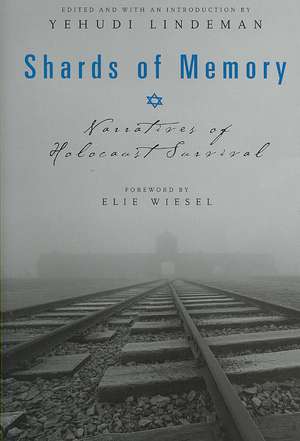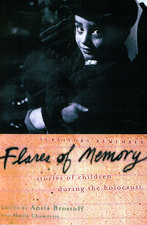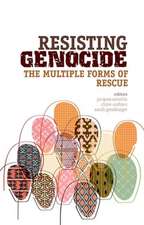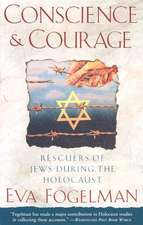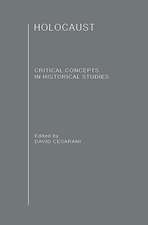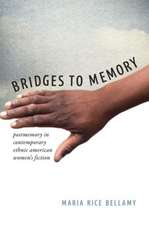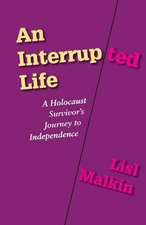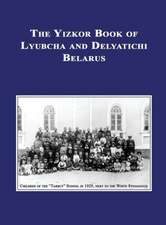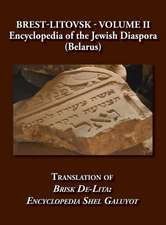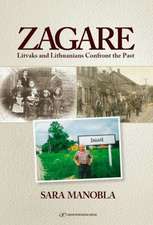Shards of Memory: Narratives of Holocaust Survival
Autor Yehudi Lindemanen Limba Engleză Hardback – 29 apr 2007 – vârsta până la 17 ani
Preț: 356.65 lei
Preț vechi: 434.98 lei
-18% Nou
Puncte Express: 535
Preț estimativ în valută:
68.24€ • 71.25$ • 56.48£
68.24€ • 71.25$ • 56.48£
Carte tipărită la comandă
Livrare economică 04-18 aprilie
Preluare comenzi: 021 569.72.76
Specificații
ISBN-13: 9780275994235
ISBN-10: 0275994236
Pagini: 256
Dimensiuni: 156 x 235 x 24 mm
Greutate: 0.55 kg
Editura: Bloomsbury Publishing
Colecția Praeger
Locul publicării:New York, United States
ISBN-10: 0275994236
Pagini: 256
Dimensiuni: 156 x 235 x 24 mm
Greutate: 0.55 kg
Editura: Bloomsbury Publishing
Colecția Praeger
Locul publicării:New York, United States
Notă biografică
Yehudi Lindeman is Professor Emeritus of English at McGill University and Director of Living Testimonies, a center for Holocaust research and documentation in Montreal. In 1990, he also contributed to founding the World Federation of Jewish Child Survivors. A child survivor of the Holocaust, he was separated from his family and moved through safe houses in Nazi-occupied Holland by members of the Dutch resistance.
Recenzii
Lindeman, director of Living Testimonies, a center for Holocaust research and documentation in Montreal, has written an excellent introduction that posits the motivation behind the needs of Shoah survivors to tell their stories. The book's chapters are arranged according to three distinctions: gender, age, and whether one survived inside or outside the camps, in hiding, or on the run. Lindeman explains that the decision to separate the chapters of women's accounts of the camps from that of the men was an effort to capture their particular experiences during the Holocaust. He is sensitive to recent Holocaust historiography that distinguishes between the gender-based behaviors of those who were victims of the Nazis. Lindeman writes that although Nazi destruction clearly did not distinguish between men and women, there are differences in terms of what was done to them (vulnerabilities) and what they did (their resources). The volume includes a country-by-country chronology discussed by the survivors, as well as a glossary. Highly recommended. All levels/libraries.
Shards of Memory is a collection of personal testimonies of various means of survival by which individuals preserved themselves in the face of the great Nazi assult on their bodies, psyches, and lives during World War II. The Living Testimonies Project at the Holocaust Video Documentation Archive of McGill University gathers and records the experiences and eyewitness accounts of Holocaust survivors through individually videotaped interviews with survivors. The current volume is a retelling of 25 of these stories. The editors convey the narratives in the survivors' own words and provide candid descritions of the subjects' tone and manner of speaking.
Since 1989, Yehudi Lindeman has been interviewing Holocaust survivors for the Living Testimonies Archive in Montreal. In this volume, he shares the stories of 25 individuals. Included are those who managed to pass as Gentiles, others who survived the death camps, and others who went into hiding or escaped. The final narrative offers the perspective of a Danish man who helped smuggle some 7,000 Jews to safety. Elie Wiesel contributes the foreword.
. . . these narratives make an important contribution to Holocaust studies by providing a framework for stories that survivors often find incredibly difficult to share. Reading these personal accounts reminds us of the time when such stories were not welcome, when even family members and friends did not want to hear about the horrific events of the past. Many of these survivors describe the difficulty they have had in discussing their past, even with their own children and grandchildren, and in this admission we can detect both the anguish of reliving their past and a sense of urgency, a need to somehow convey and preserve their experiences. Moreover, this volume reminds us that there are still many stories that have not been shared. Shards of Memory challenges all of us to recognize and appreciate the genuine difficulty of recalling and sharing the terrible realities of the past. Each of the stories in this collection is a reminder that there is yet one more testimony to hear, and that it is our human obligation to listen and learn.
Shards of Memory is a collection of personal testimonies of various means of survival by which individuals preserved themselves in the face of the great Nazi assult on their bodies, psyches, and lives during World War II. The Living Testimonies Project at the Holocaust Video Documentation Archive of McGill University gathers and records the experiences and eyewitness accounts of Holocaust survivors through individually videotaped interviews with survivors. The current volume is a retelling of 25 of these stories. The editors convey the narratives in the survivors' own words and provide candid descritions of the subjects' tone and manner of speaking.
Since 1989, Yehudi Lindeman has been interviewing Holocaust survivors for the Living Testimonies Archive in Montreal. In this volume, he shares the stories of 25 individuals. Included are those who managed to pass as Gentiles, others who survived the death camps, and others who went into hiding or escaped. The final narrative offers the perspective of a Danish man who helped smuggle some 7,000 Jews to safety. Elie Wiesel contributes the foreword.
. . . these narratives make an important contribution to Holocaust studies by providing a framework for stories that survivors often find incredibly difficult to share. Reading these personal accounts reminds us of the time when such stories were not welcome, when even family members and friends did not want to hear about the horrific events of the past. Many of these survivors describe the difficulty they have had in discussing their past, even with their own children and grandchildren, and in this admission we can detect both the anguish of reliving their past and a sense of urgency, a need to somehow convey and preserve their experiences. Moreover, this volume reminds us that there are still many stories that have not been shared. Shards of Memory challenges all of us to recognize and appreciate the genuine difficulty of recalling and sharing the terrible realities of the past. Each of the stories in this collection is a reminder that there is yet one more testimony to hear, and that it is our human obligation to listen and learn.
